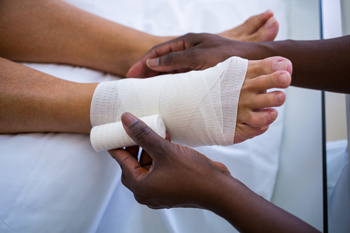Items filtered by date: December 2021
What Are Causes of Stress Fractures?
 Most people have heard of shin splints, which affect the lower leg bone as the result of hard pounding while running. But this same activity can also affect the metatarsals of the foot, resulting in stress fractures. Metatarsals are the five long bones in the foot that connect the heel and arch to the toes. The second and third metatarsals are those most likely to develop stress fractures, which are tiny cracks in the bones. This makes sense because this is the area of the foot that takes the brunt of pounding during activity. Stress fractures are thought to be more common in women and older people. Participating in certain activities – including running, playing basketball, dancing, and marching – also increases the likelihood of developing stress fractures. In addition, osteoporosis, arthritis, diabetes, and calcium deficiency can be contributing factors. It may be hard to tell if you have stress fractures, because often the pain subsides after you stop the activity. However, if you begin to feel the pain even when you are not exercising, it is suggested that you seek the care of a podiatrist, who can properly diagnose your condition and suggest an appropriate treatment plan.
Most people have heard of shin splints, which affect the lower leg bone as the result of hard pounding while running. But this same activity can also affect the metatarsals of the foot, resulting in stress fractures. Metatarsals are the five long bones in the foot that connect the heel and arch to the toes. The second and third metatarsals are those most likely to develop stress fractures, which are tiny cracks in the bones. This makes sense because this is the area of the foot that takes the brunt of pounding during activity. Stress fractures are thought to be more common in women and older people. Participating in certain activities – including running, playing basketball, dancing, and marching – also increases the likelihood of developing stress fractures. In addition, osteoporosis, arthritis, diabetes, and calcium deficiency can be contributing factors. It may be hard to tell if you have stress fractures, because often the pain subsides after you stop the activity. However, if you begin to feel the pain even when you are not exercising, it is suggested that you seek the care of a podiatrist, who can properly diagnose your condition and suggest an appropriate treatment plan.
Activities where too much pressure is put on the feet can cause stress fractures. To learn more, contact one of our podiatrists from Parkwood Podiatry. Our doctors can provide the care you need to keep your pain free and on your feet.
Dealing with Stress Fractures of the Foot and Ankle
Stress fractures occur in the foot and ankle when muscles in these areas weaken from too much or too little use. The feet and ankles then lose support when walking or running from the impact of the ground. Since there is no protection, the bones receive the full impact of each step. Stress on the feet can cause cracks to form in the bones, thus creating stress fractures.
What Are Stress Fractures?
Stress fractures occur frequently in individuals whose daily activities cause great impact on the feet and ankles. Stress factors are most common among:
- Runners
- People affected with Osteoporosis
- Tennis or basketball players
- Gymnasts
- High impact workouts
Symptoms
Pain from the fractures occur in the area of the fractures and can be constant or intermittent. It will often cause sharp or dull pain with swelling and tenderness. Engaging in any kind of activity which involves high impact will aggravate pain.
If you have any questions please feel free to contact our offices located in Brunswick and Hinesville, GA . We offer the newest diagnostic and treatment technologies for all your foot and ankle needs.
When the Wound on Your Foot Becomes an Ulcer
Wounds can occur on the feet from an injury, poor circulation, prolonged pressure from improperly fitted shoes, or complications from diseases like diabetes, neuropathy, and vascular disease. Over time, if these wounds do not close and the underlying tissue becomes affected, they are considered ulcers. These types of wounds are potentially dangerous – particularly in people with diabetes. Ulcers can lead to infections in the bone and skin. You can sometimes tell if the wound on your foot has become an ulcer if it is draining, emits a foul odor, or the tissue has become thickened, inflamed, or red. It is important to seek the professional wound care that a podiatrist can provide to help heal the wound and prevent more serious complications from developing. Podiatrists typically begin by cleaning the wound and removing any unhealthy tissue, termed debridement. Antibiotics may be prescribed if an infection is present. They may also suggest certain shoes and orthotics that will keep pressure off the wound and, in severe cases, perform surgery and other methods of wound care.
Wound care is an important part in dealing with diabetes. If you have diabetes and a foot wound or would like more information about wound care for diabetics, consult with one of our podiatrists from Parkwood Podiatry. Our doctors will assess your condition and provide you with quality foot and ankle treatment.
What Is Wound Care?
Wound care is the practice of taking proper care of a wound. This can range from the smallest to the largest of wounds. While everyone can benefit from proper wound care, it is much more important for diabetics. Diabetics often suffer from poor blood circulation which causes wounds to heal much slower than they would in a non-diabetic.
What Is the Importance of Wound Care?
While it may not seem apparent with small ulcers on the foot, for diabetics, any size ulcer can become infected. Diabetics often also suffer from neuropathy, or nerve loss. This means they might not even feel when they have an ulcer on their foot. If the wound becomes severely infected, amputation may be necessary. Therefore, it is of the upmost importance to properly care for any and all foot wounds.
How to Care for Wounds
The best way to care for foot wounds is to prevent them. For diabetics, this means daily inspections of the feet for any signs of abnormalities or ulcers. It is also recommended to see a podiatrist several times a year for a foot inspection. If you do have an ulcer, run the wound under water to clear dirt from the wound; then apply antibiotic ointment to the wound and cover with a bandage. Bandages should be changed daily and keeping pressure off the wound is smart. It is advised to see a podiatrist, who can keep an eye on it.
If you have any questions, please feel free to contact our offices located in Brunswick and Hinesville, GA . We offer the newest diagnostic and treatment technologies for all your foot care needs.
Several Easy Steps of Foot Care
Caring for your feet is an important part of maintaining your foot health. This can be accomplished through several easy steps. First, you should wash your feet every day with soap and water to keep them clean. Next, dry your feet thoroughly, particularly in between the toes. This helps prevent foot fungus. Afterwards, apply a thick moisturizer to your feet and especially the heels. If you find that you have dry heels, exfoliate them once or twice a month using a wet pumice stone or loofah. Pamper your feet occasionally with a soak in warm water. Finally, make sure that you are wearing comfortable shoes and socks each day. For more information about daily foot care, please consult with a podiatrist.
Everyday foot care is very important to prevent infection and other foot ailments. If you need your feet checked, contact one of our podiatrists from Parkwood Podiatry. Our doctors can provide the care you need to keep you pain-free and on your feet.
Everyday Foot Care
Often, people take care of their bodies, face and hair more so than they do for their feet. But the feet are a very important aspect of our bodies, and one that we should pay more attention to. Without our feet, we would not be able to perform most daily tasks.
It is best to check your feet regularly to make sure there are no new bruises or cuts that you may not have noticed before. For dry feet, moisturizer can easily be a remedy and can be applied as often as necessary to the affected areas. Wearing shoes that fit well can also help you maintain good foot health, as well as making it easier to walk and do daily activities without the stress or pain of ill-fitting shoes, high heels, or even flip flops. Wearing clean socks with closed shoes is important to ensure that sweat and bacteria do not accumulate within the shoe. Clean socks help to prevent Athlete’s foot, fungi problems, bad odors, and can absorb sweat.
If you have any questions please feel free to contact our offices located in Brunswick and Hinesville, GA . We offer the newest diagnostic and treatment technologies for all your foot and ankle needs.
5 Possible Causes of Heel Pain
As the foundation of the body, the foot and ankle are complex, amazing structures made up of many ligaments, nerves, tendons, joints, and bones—including the largest bone in the foot, the heel. The heel helps form the arch and manages stress during walking and running. All of this use and stress can lead to painful conditions of the heel and its surrounding tendons and ligaments. Plantar fasciitis, the most common form of heel pain, is an inflammation of the connective tissue that spans the bottom of the foot (plantar fascia). Another common form of heel pain occurs with Achilles tendonitis, which causes inflammation and pain in the (Achilles) tendon that attaches the heel with the calf muscles. A loss of cushioning in the plantar fat pad can cause the heel to become bruised, and the heel bone can also fracture, causing intense pain. Retrocalcaneal Bursitis is an inflammation of the fluid-filled bursa sac that cushions the back of the heel bone. Any type of heel pain should be diagnosed by a podiatrist. who can assess the situation and create an appropriate treatment plan based on their findings.
Many people suffer from bouts of heel pain. For more information, contact one of our podiatrists of Parkwood Podiatry. Our doctors can provide the care you need to keep you pain-free and on your feet.
Causes of Heel Pain
Heel pain is often associated with plantar fasciitis. The plantar fascia is a band of tissues that extends along the bottom of the foot. A rip or tear in this ligament can cause inflammation of the tissue.
Achilles tendonitis is another cause of heel pain. Inflammation of the Achilles tendon will cause pain from fractures and muscle tearing. Lack of flexibility is also another symptom.
Heel spurs are another cause of pain. When the tissues of the plantar fascia undergo a great deal of stress, it can lead to ligament separation from the heel bone, causing heel spurs.
Why Might Heel Pain Occur?
- Wearing ill-fitting shoes
- Wearing non-supportive shoes
- Weight change
- Excessive running
Treatments
Heel pain should be treated as soon as possible for immediate results. Keeping your feet in a stress-free environment will help. If you suffer from Achilles tendonitis or plantar fasciitis, applying ice will reduce the swelling. Stretching before an exercise like running will help the muscles. Using all these tips will help make heel pain a condition of the past.
If you have any questions please contact our offices located in Brunswick and Hinesville, GA . We offer the newest diagnostic and treatment technologies for all your foot and ankle needs.




